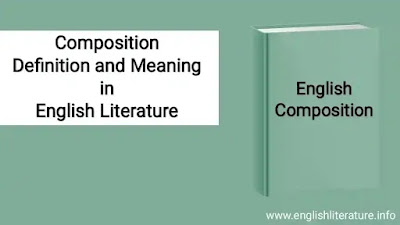Also Read
Composition:
Composition, from the Latin words con, meaning together and ponere, meaning to place, signifies a placing together a grouping or arrangement of objects or of ideas. This arrangement is generally made so that it will produce a desired result. Speaking accurately, the putting together is the composition. Much of the desired result is gained by care in the selection of materials. Placing together a well-worn book, a lamp, and a pair of heavy bowed spectacles makes a suggestive picture. The selection and grouping of these objects is spoken of as the composition of the picture. So in music, an author composes, when he groups certain musical tones and phrases so that they produce a desired effect. In literature, too, composition is, strictly speaking, the selection and arrangement of materials, whether the incidents of a story or the details of a description, to fulfill a definite purpose.
English Composition:
In practice, however, English composition has come to include more than the selection and arrangement of the materials,—incidents, objects, or ideas, as the case may be; the term has been extended to include the means by which the speaker or writer seeks to convey this impression to other persons. As a painter must understand drawing, the value of lights and shades, and the mixing of colors before he can successfully reproduce for others the idea he has to express, so the artist in literature needs a knowledge of elementary grammar and of the simpler usages of language in order clearly to represent to others the idea which lies in his own mind. As commonly understood, then, English composition may be defined as the art of selecting, arranging, and communicating ideas by means of the English language.
Composition, Written and Oral:
The term “English composition” is now generally understood to mean written composition, and not oral composition. At first thought they seem to be the same thing. So far as the selection and arrangement of matter is concerned, they are the same. Moreover, both use words, and both employ sentences; but here the likeness ends. If sentences should be put upon paper exactly as they were spoken, in most instances they would not convey to a reader the same thought they conveyed to a listener. It is much more exacting to express the truth one wishes to convey, by silent, featureless symbols than by that wonderful organ of communication, the human voice. Now, if to the human voice be added eyes, features, gestures, and pose, we easily understand the great advantage a speaker has over a writer.
Conventions of Composition:
Moreover, there are imposed upon a writer certain established rules which he must follow. He must spell words correctly, and he must use correctly marks of punctuation. These things need not annoy a speaker; yet they are conditions which must be obeyed by a writer. A man who eats with a knife may succeed in getting his food to his mouth, yet certain conventions exclude such a person from polite society. So in composition, it is possible for a person to make himself understood, though he write “alright” instead of “all right,” and never use a semicolon; still, such a person could hardly be considered a highly cultured writer. To express one’s thoughts correctly and with refinement requires absolute obedience to the common conventions of good literature.
The study of composition includes, first, the careful selection of materials and their effective arrangement; and second, a knowledge of the established conventions of literature: of spelling; of the common uses of the marks of punctuation,—period, question mark, exclamation point, colon, semicolon, comma; of the common idioms of our language; and of the elements of its grammar. From the beginning of the high school course, the essay, the paragraph, the sentence, the word, are to be studied with special attention to the effective use of each in adequately communicating ideas.
Conclusion:
English composition, then, is a study of the selection and arrangement of ideas, and of the methods of using the English language to communicate them. All composition is divided into five great classes. These classes have broad lines of distinction, which are most easily applied by determining the purpose of the author.
